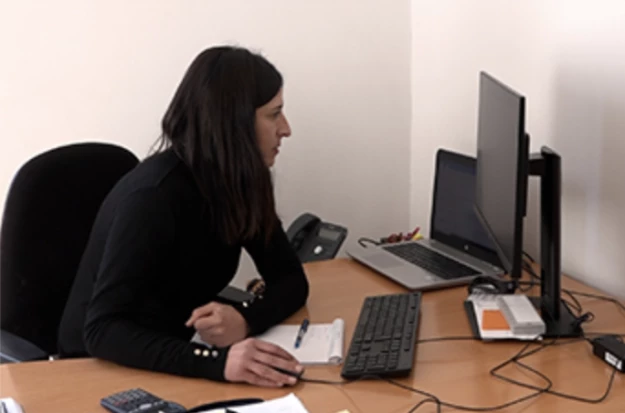Integration and Counselling Unit
Ensuring equity and academic success for students at the University of Coimbra
The University of Coimbra (UC) has been offering services to support students with special needs since 1989. This support began with the creation of the Technical-Pedagogical Support Office for Students with Disabilities at the end of the 1980s and was further consolidated with the establishment of the Integration and Counselling Unit (NIA) within the Social Services of the University of Coimbra (SASUC). In this UC structure, staff work daily to support students with special needs and provide psycho-pedagogical support to all students. From defining and monitoring measures to assist students with specific conditions to organising sessions that facilitate academic integration, the NIA plays a key role in fostering inclusion for all students at the University of Coimbra.
The mission of NIA is "to provide support and social responses to ensure equal opportunities in terms of access, participation and academic success of students in higher education", according to the head of the service, Maria João Rodrigues. This support is offered so that each student can be fully successful throughout their university journey, sometimes through individualised measures, because "equal opportunities does not mean that everyone has to be treated in the same way, but it means recognising the differences of each person, understanding if they pose obstacles to fair integration in higher education and finding answers to overcome these obstacles and ensure the inclusion of all UC students".
The support provided by the Integration and Counselling Unit, in terms of promoting equity and academic success, is implemented in two areas: 1) psycho-pedagogical support for students of the University of Coimbra; 2) support for students with special needs. In each of these areas, support is provided according to the needs of each student, who comes to NIA with different difficulties in terms of success and integration in the academic context. In addition to these two programmes, NIA also provides activities to support the integration and well-being of students living in university residences.
As part of academic integration, the UC Skills training programme is one of the support services offered to students in the UC community. With a focus on preventing academic failure, this programme consists of four training sessions, "working on several tools that are essential for the academic success of our students, such as time management, study methods, oral presentation and managing stress and anxiety," explains Margarida Rodrigues, psychologist at the SASUC Welcome and Integration Department. During the COVID-19 pandemic, this support, which used to be provided face-to-face, became available online, with good results, and has been maintained in order to reach more and more students. The UC Skills programme is streamlined each academic semester and also responds to "tailor-made" training requests received from the Student Nuclei of the Academic Association of Coimbra or UC student associations.
On a more tailored approach, students are offered an academic coaching programme "aimed at implementing psycho-pedagogical tools for students who are failing or at risk of dropping out of school".
A student is considered to be in a situation of academic failure if he/she has completed less than 36 ECTS in the last academic year of enrolment, a criterion that is also used as an eligibility criterion for access to direct support (such as scholarships and the Social Support Fund) and some indirect support (such as PASEP - Programme for Social Support to Students through Part-time Activities and Accommodation) of the Social Services of the University of Coimbra. However, other scenarios are also considered, such as cases where students are demotivated with their academic path or do not like their study programme. In these situations, coaching "is also based on referrals, namely to the school reorientation services of the Faculty of Psychology and Education of the UC, to the Justice and Peace Institute, which has tutoring programmes, or to the health services of SASUC, since clinical psychology consultations can also be very helpful," adds the psychologist. The individual support programme was designed for students living in university residences, because "they are students who receive social support and therefore have a higher vulnerability and risk factor for school failure," Margarida Rodrigues points out. Although it is aimed at students with social support, the NIA's psycho-educational support is open to all students in the UC community as a preventive measure against exclusion from access to support due to poor academic performance.
The other main area of activity of the Integration and Counselling Unit focuses on the support and monitoring of students with special needs. The technical and specialised intervention consists of a personalised follow-up of students from all courses and cycles of the University, with different pathologies, such as "some kind of visual impairment, organic disability, motor disability, autism, dyslexia or oncological diseases", explains Patrícia Araújo, Senior Technician of the SASUC Welcoming and Integration Unit.
The monitoring of students in the recognition of the status of student with special needs, provided for in the UC Academic Regulations, begins with an interview requested by the student, in which "a confirmation of the status is made, taking into account their clinical situation, to understand what difficulties the student may have or already has, since they often arrive with a referral from secondary schools", says Patrícia Araújo. From this initial contact, "together with the student, we evaluate and see what are the most appropriate measures so that he/she can continue his/her studies with equity and with fewer difficulties," adds Patrícia Araújo. The measures are defined on the basis of the medical certificate and in close collaboration with the health professionals who accompany the students so that the most appropriate measures can be found for each specific situation.
After that, "the status is validated and the student receives the status, which opens up various opportunities," explains the senior technician. These opportunities include measures such as "extra time for exams; not counting mistakes due to dyslexia; free parking for students with certain pathologies; recording classes for study purposes; having a reference person within the faculty in cases of autism", says Patrícia Araújo. The collaboration with the faculties, especially with the Pedagogical Councils and the teachers, is also an essential part of the integration of students with pathologies such as the ones mentioned above, because this proximity makes it possible to "understand the difficulties that the teachers have in applying the measures that have been defined", says the Senior Technician of the Integration and Counselling Unit.To support these students, the Centre for the Production of Technical and Educational Materials develops teaching materials in alternative formats to help students with visual impairments. Rosário Gomes, Senior Technician of the Welcoming and Integration Department of the SASUC, explains that the materials are produced in four formats: 1) Braille, on paper to be handled by the student; 2) Digital, which is the most produced and involves the conversion of a book into digital material to be listened to according to the needs of the reader; 3) Enlarged, for students with low vision or near blindness, with works enlarged to the size most suitable for the student; 4) Embossed materials, to complement the study, especially in subjects such as geography, statistics or art, with embossed elements that greatly facilitate the understanding and mental construction of objects.
The materials developed by NIA's Centre for the Production of Technical and Educational Materials are designed after an initial contact with the student in which he/she explains how he/she studies. Based on this information, the process of preparing study materials and also assessment materials, such as tests, begins. The dialogue with the teachers is also fundamental in this process, not only to provide the materials for the correct integration of the student, but also to promote "the interaction of normovisuals in the classroom with visually impaired students" or "to support projects being developed regarding visual impairment", says Rosário Gomes.
To ensure equity in the academic journey of every student at the University of Coimbra, the Integration and Counselling Centre is always looking for new ways to promote and guarantee the rights of all students, regardless of their financial situation, social context or pathologies. This path of integration and counselling is based on regular contacts with students, teachers and even other educational institutions, so that the support network is ever widening and no one is left out.
Some Data about the Integration and Counselling Unit
Support provided: support for students with special needs, psycho-pedagogical support, psychology consultations, and production of materials for students with visual impairment.
Application for the Status of Student with Special Educational Needs: first and second semesters of each academic year.
Contacts: 239 101 282 | 239 240 848 | gabadmin@sas.uc.pt
Website: https://www.uc.pt/en/sasuc/Welcome-and-Integration
Address: Rua Oliveira Matos, nº 27, 3000-305 Coimbra | Colégio S. Jerónimo, Largo D. Dinis, ground floor, 3001-401 Coimbra
Content Production and Editing: Catarina Ribeiro and Inês Coelho, DCOM
Image Editing: Sara Baptista, NMAR
Translation: Diana Taborda
Published on 16.02.2022



